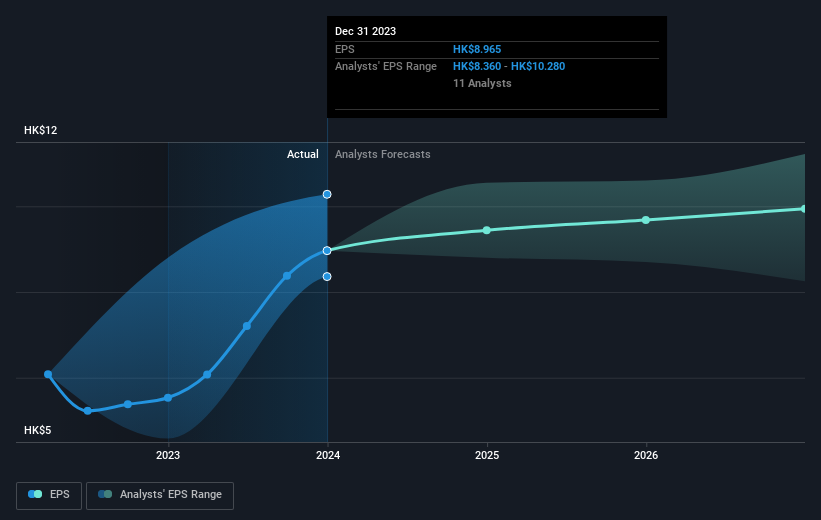Stock Analysis
Shareholders in Hang Seng Bank (HKG:11) are in the red if they invested five years ago

While not a mind-blowing move, it is good to see that the Hang Seng Bank Limited (HKG:11) share price has gained 11% in the last three months. But over the last half decade, the stock has not performed well. In fact, the share price is down 48%, which falls well short of the return you could get by buying an index fund.
With that in mind, it's worth seeing if the company's underlying fundamentals have been the driver of long term performance, or if there are some discrepancies.
View our latest analysis for Hang Seng Bank
There is no denying that markets are sometimes efficient, but prices do not always reflect underlying business performance. One imperfect but simple way to consider how the market perception of a company has shifted is to compare the change in the earnings per share (EPS) with the share price movement.
Looking back five years, both Hang Seng Bank's share price and EPS declined; the latter at a rate of 6.2% per year. Readers should note that the share price has fallen faster than the EPS, at a rate of 12% per year, over the period. This implies that the market is more cautious about the business these days. The low P/E ratio of 11.09 further reflects this reticence.
The graphic below depicts how EPS has changed over time (unveil the exact values by clicking on the image).

We know that Hang Seng Bank has improved its bottom line lately, but is it going to grow revenue? This free report showing analyst revenue forecasts should help you figure out if the EPS growth can be sustained.
What About Dividends?
When looking at investment returns, it is important to consider the difference between total shareholder return (TSR) and share price return. The TSR is a return calculation that accounts for the value of cash dividends (assuming that any dividend received was reinvested) and the calculated value of any discounted capital raisings and spin-offs. Arguably, the TSR gives a more comprehensive picture of the return generated by a stock. As it happens, Hang Seng Bank's TSR for the last 5 years was -35%, which exceeds the share price return mentioned earlier. This is largely a result of its dividend payments!
A Different Perspective
Hang Seng Bank shareholders are down 3.4% for the year (even including dividends), but the market itself is up 5.5%. Even the share prices of good stocks drop sometimes, but we want to see improvements in the fundamental metrics of a business, before getting too interested. However, the loss over the last year isn't as bad as the 6% per annum loss investors have suffered over the last half decade. We would want clear information suggesting the company will grow, before taking the view that the share price will stabilize. I find it very interesting to look at share price over the long term as a proxy for business performance. But to truly gain insight, we need to consider other information, too. Case in point: We've spotted 1 warning sign for Hang Seng Bank you should be aware of.
If you would prefer to check out another company -- one with potentially superior financials -- then do not miss this free list of companies that have proven they can grow earnings.
Please note, the market returns quoted in this article reflect the market weighted average returns of stocks that currently trade on Hong Kong exchanges.
Valuation is complex, but we're here to simplify it.
Discover if Hang Seng Bank might be undervalued or overvalued with our detailed analysis, featuring fair value estimates, potential risks, dividends, insider trades, and its financial condition.
Access Free AnalysisHave feedback on this article? Concerned about the content? Get in touch with us directly. Alternatively, email editorial-team (at) simplywallst.com.
This article by Simply Wall St is general in nature. We provide commentary based on historical data and analyst forecasts only using an unbiased methodology and our articles are not intended to be financial advice. It does not constitute a recommendation to buy or sell any stock, and does not take account of your objectives, or your financial situation. We aim to bring you long-term focused analysis driven by fundamental data. Note that our analysis may not factor in the latest price-sensitive company announcements or qualitative material. Simply Wall St has no position in any stocks mentioned.
Have feedback on this article? Concerned about the content? Get in touch with us directly. Alternatively, email editorial-team@simplywallst.com
About SEHK:11
Hang Seng Bank
Provides various banking and related financial services to individual, corporate, commercial, small and medium-sized enterprises, and institutional customers in Hong Kong, the Mainland of China, and internationally.
Proven track record with adequate balance sheet and pays a dividend.

